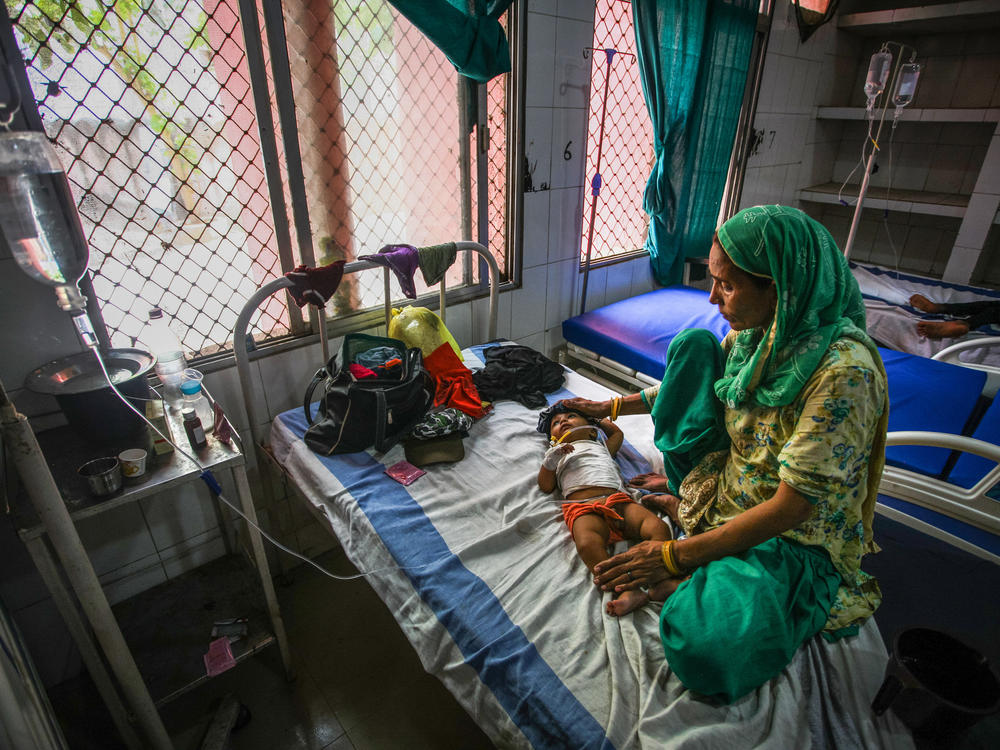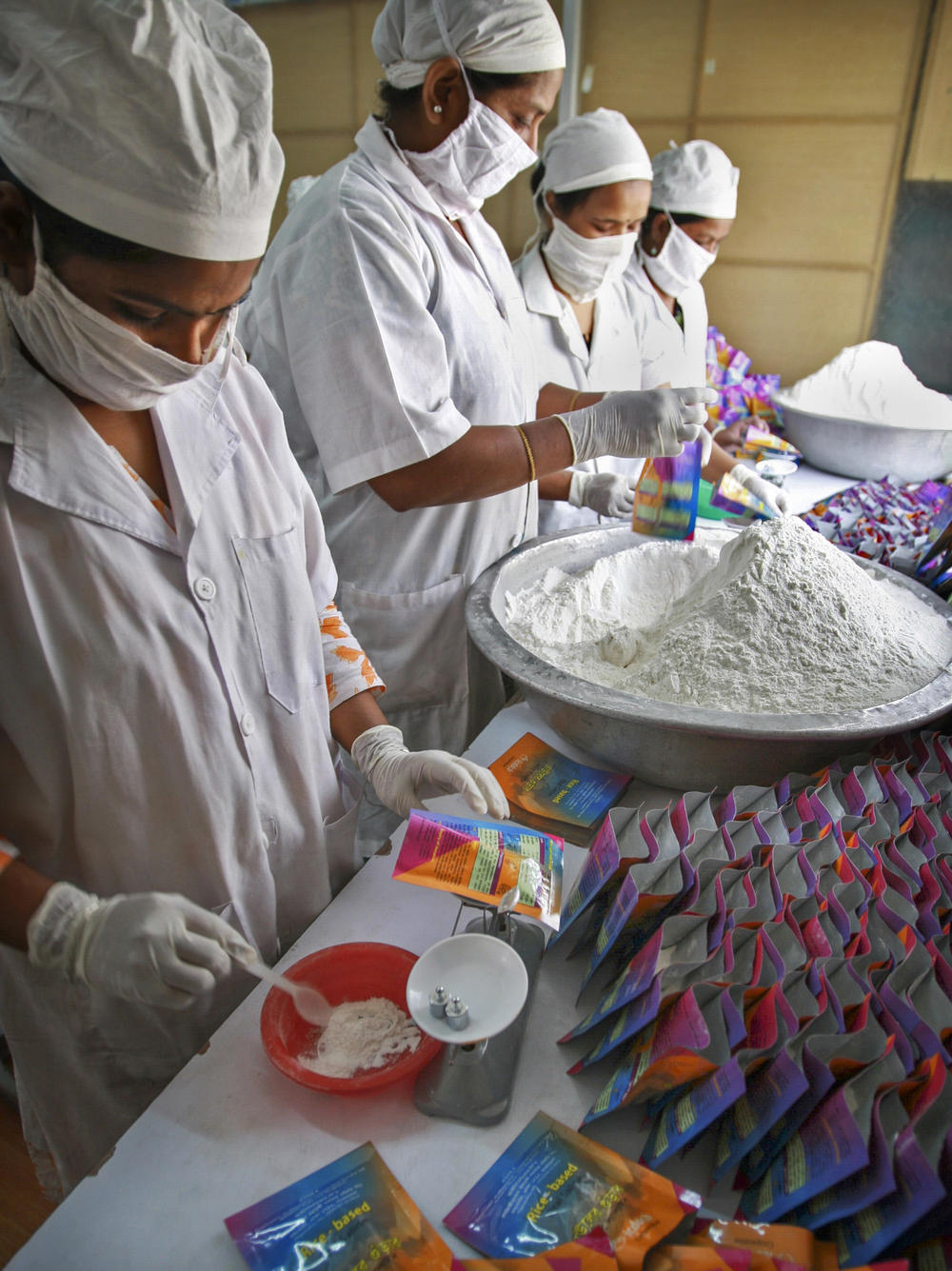Section Branding
Header Content
There's a cheap and effective way to treat childhood diarrhea. So why is it underused?
Primary Content
Every year, nearly 500,000 children die from an easily curable condition: diarrhea.
There's a simple and effective treatment: mixing oral rehydration salts — which are basically a mix of sugar and salt in the form of glucose and electrolytes — for the child to drink to restore the body fluids that are lost during bouts of diarrhea. It works by keeping the body hydrated. These salts are available in small plastic pouches.
But a new study published in the journal Science this month found that though doctors knew about oral rehydration salts (ORS), they just weren't prescribing them enough.
The study was conducted by researchers from RAND, the University of Southern California, Duke University and Indian Institute of Management in the Southern Indian city of Bengaluru.
Zachary Wagner, one of the study's lead authors and an economist and professor at the Pardee RAND graduate school in California, says this is a subject he's been researching for the last ten years.
"The problem is massive," he says. "Hundreds of thousands of kids die from diarrhea, when none of them should be dying. There's a treatment that's been around for decades that we know is really effective. When you ask doctors in surveys, what they would do for a hypothetical case of diarrhea, most of them say they would prescribe ORS. If that's the case, why wasn't it being used? That's what we set out to find," he says.
The study took place in two Indian states: Karnataka and Bihar. The authors chose states that were very different in literacy levels, socioeconomic status and diarrhea care.
Bihar in the east is one of India's poorest states, with 46% of the adult population having very little schooling and only 42% having completed high school. By contrast, Karnataka in the South has above average per capita income. Only 26% of the adult population have little schooling and 62% have completed high school.
Additionally, Bihar was chosen because of its below average use of oral rehydration salts (57% of diarrhea cases are treated with ORS compared to the national average of 61%); Karnataka has above average ORS use with 70% of the cases being treated with ORS.
Recruiting 'fathers'
The way they conducted the study was a little unusual. The study employed data collectors, who were trained to pose as the father of a 2-year-old child with diarrhea symptoms.
Meagan Phelan, communications director for the Science family of journals that published the study says, "In health economics experiments, use of actors is typical to avoid biases and ensure the results are as reliable as possible."
In each state, the study authors recruited 40 people to pose as caregivers for patients. They approached 2,282 health-care practitioners in 253 medium-sized towns. "Though we call them actors, these are people trained to collect data," Wagner says. "In many cases, they were fathers of young children, so the role we were training them to play was very similar to their own selves."
All of the actors presented a case of diarrhea in their "children" that were similar to the symptoms caused by the common viral germ — rotavirus. Half of these actors presented a moderate case of diarrhea (describing four to five loose stools the previous night) and the other half were told to present a severe case (10 -12 loose stools the previous night and symptoms of dehydration). According to the standard of care in the Indian Academy of Pediatrics, both types of cases would require ORS treatment. Though antibiotics are deemed appropriate for some cases of child diarrhea – where there's blood in the stools or sticky or "smelly" feces. The actors steered clear of these symptoms, so that it would be clear to doctors that they approached that antibiotics would not be necessary.
At first, the authors were concerned that not having a real child to assess would affect the outcome of what the doctors prescribed. But surveys show this is a common way to seek care for child diarrhea in India.
"We designed the study to see what was really driving the problem.
One theory: "patients were driving the problem by demanding antibiotics," says Wagner. Other possibilities: physicians assumed young patients would not like the taste of oral salts; parents didn't think ORS were serious medication; the salts were out of stock (they're not as lucrative as other medicines); and doctors were perhaps making more money by prescribing antibiotics, even though, says Wagner, they're not as effective as ORS in treating diarrhea.
An unexpected finding
The study's results were a surprise, Wagner says. The under-prescription wasn't due to the interference of parents. Lack of supply accounted for only a 6% dip in prescriptions; financial incentives for doctors accounted for only a 5% dip.
But there was one dominant reason for not prescribing oral rehydration salts: Nearly half of the cases of failure to prescribe were because the health-care provider assumed the parents would not be satisfied with ORS. But if the caregiver were to express their willingness to use the ORS – some of the actors in the study for instance, showed the doctors a picture of the ORS on their cellphones and mentioned how they'd been prescribed it on a previous occasion — ORS prescriptions rose by as much as 27%.
The study also found that other factors play a role in under-prescribing the ORS in India.
In the two states, the study conducted household surveys. "We surveyed 1,200 households where there was a case of diarrhea over the last four weeks," says Wagner. They learned that 400 of these patients went to a pharmacy rather than a doctor – and pharmacies had the worst record in over-prescribing antibiotics and under-prescribing ORS, Wagner says. ORS was recommended for only 17% of the 400 pharmacy patients. "Surveys showed that this wasn't because pharmacists lacked the knowledge that ORS would work, but that they had clear financial incentives to sell antibiotics," he says.
And that's an important takeaway, says Wagner. With efforts to curb antibiotic overuse, "we want to highlight that a lot of inappropriate antibiotic prescriptions are coming from child diarrhea."
Dr. Prashant Nuggehalli Srinivas, a public health researcher and clinician who was not a part of the study, says the findings are important, because for the first time, it shifts the responsibility from the patient to the health-care provider.
Srinivas lives and works in rural Chamarajanagar, a town adjoining forest areas with a high population of tribal villages in the southern Indian state of Karnataka.
Blaming the parents
In many cases, he's seen health authorities blame parents when a child dies from an easily curable disease like diarrhea. The parents are characterized as either considered uneducated or superstitious to understand the value of rehydration salts. But in this study, that responsibility is shifted to the practitioner. "The study has made it clear that health-care providers are not doing enough to convince people of the dangers of severe dehydration and the restorative ability of oral salts," he says .
This information is critical in rural areas, Srinivas says, because diarrhea can progress in a matter of hours into a life-threatening condition and the family may find it difficult to access care. "If a child has severe diarrhea, and is not prescribed an ORS, the family would have to consider taking him to the nearest hospital because they would need to administer intravenous fluids— that would mean walking three to four hours while carrying the sick child on your back."
There may be other reasons for the underprescribing of ORS: We still need more evidence as to why so many children fail to receive oral rehydration salts, says Dr. Santhosh Rajagopal, a pediatrician and surveillance medical officer at the World Health Organization (WHO) who was not a part of the study.
"Nevertheless, millions of young lives could be saved if we can find ways to increase their use," he says.
It's a reminder of how even small interventions can have a huge, life changing impact in global health, says Srinivas.
Kamala Thiagarajan is a freelance journalist based in Madurai, Southern India. She reports on global health, science and development and has been published in The New York Times, The British Medical Journal, the BBC, The Guardian and other outlets. You can find her on X @kamal_t
Bottom Content


